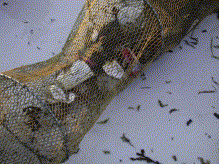Plastic goes with the flow in London’s Thames River
A new report just published in the Marine Pollution Bulletin reveals that a stream of plastic waste is flowing along the bed of the river Thames and out into the North Sea.
January 7, 2014
A new report just published in the Marine Pollution Bulletin reveals that a stream of plastic waste is flowing along the bed of the river Thames and out into the North Sea.
The report was compiled by a team of scientists the Natural History Museum and Royal Holloway, University of London, who were originally studying different types of "fyke nets" - a type of cylindrical fish trap equipped with funnel-shaped openings which make it easy for fish to enter the trap but difficult to get out - as part of a project aimed at reducing the numbers of invasive mitten crabs in the River Thames, while assisting in the conservation of eels.
 Alarmed by the enormous amount of plastic waste netted in the course of the trial, the team published its findings in a report entitled, "Plastic in the Thames: A River Runs Through It."
Alarmed by the enormous amount of plastic waste netted in the course of the trial, the team published its findings in a report entitled, "Plastic in the Thames: A River Runs Through It."
As the authors write: "Although contamination of the marine ecosystems by plastics is becoming recognized as a serious pollution problem, there are few studies that demonstrate the contribution made by freshwater catchments. Over a three-month period from September to December 2012, at seven localities in the upper Thames estuary, 8490 submerged plastic items were intercepted in eel fyke nets anchored to the riverbed. Whilst there were significant differences in the numbers of items at these locations, the majority were some type of plastic. Additionally in excess of 20% of the litter items were components of sanitary products. The most contaminated sites were in the vicinity of sewage treatment works. While floating litter is visible, this study also demonstrates that a large unseen volume of submerged plastic is flowing into the marine environment. It is therefore important that this sub-surface component is considered when assessing plastic pollution input into the sea."
The British Plastics Federation was swift to respond and downplayed any actual threat.
"Chemicals used in the manufacture of plastics are so heavily regulated and controlled by the REACH food contact legislation that the toxic risk to the Thames and ultimately to consumers from a plastics product being irresponsibly discarded is infinitesimally tiny, if indeed it exists at all," it said in an issued release.
It followed up with a classic passing-the-buck statement:
"If used products are turning up in these quantities in the Thames then this just underlines the need for stiffer penalties applied for littering, dumping and fly-tipping. London suffers from the absence of litterbins in its major thoroughfares due to past terrorist actions. If the country is truly serious about dealing decisively with littering and associated dumping then the government should apply more resources to public education programs."
About the Author(s)
You May Also Like


